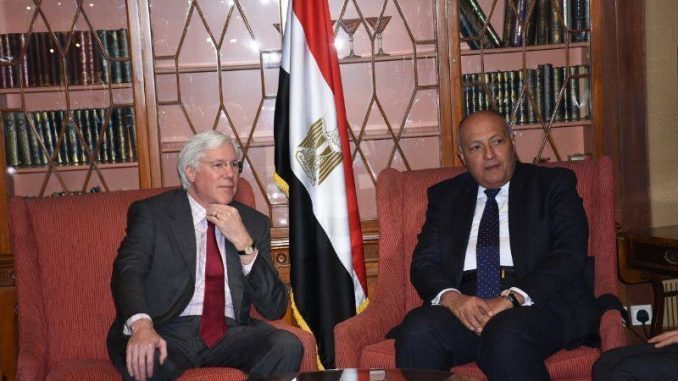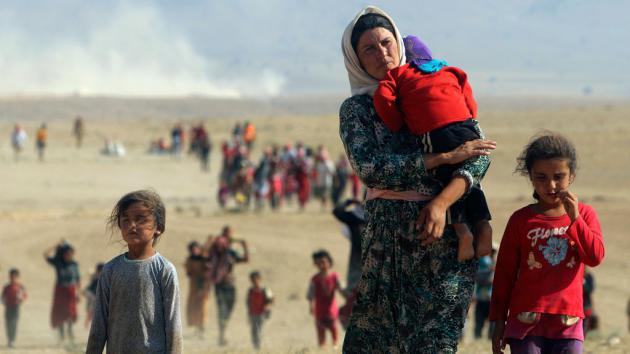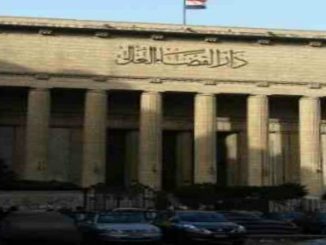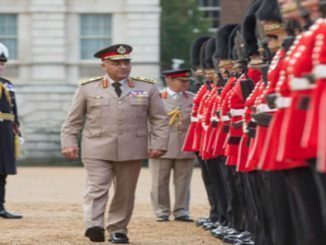
Egypt’s Abdel Fattah Al-Sisi and Foreign Minister Sameh Shoukry met the American Jewish Committee delegation that visited Egypt on December 19.
According to a presidential statement, both al-Sisi and Sameh Shoukry stressed Egypt’s eagerness to enhance bilateral relations with the United States during a meeting with a delegation from the American Jewish Committee.
During their meeting with Abdel Fattah al-Sisi, he stressed that Egypt is always in contact with different parties in the US in order to clarify the situation in the region.
Al-Sisi also discussed terrorism and its repercussions not only on Egypt and the Middle East but also on the entire international community.
He also added that US efforts in the region should continue, especially regarding talks on the Palestinian-Israeli conflict. Al-Sisi said that there should be a fair and permanent solution to the Palestinian issue.
On the other side, the American Jewish Committee praised Egypt’s attempts in trying to bring Palestine and Israel back to the negotiations table.
In the same context, Egypt’s Foreign Minister Sameh Shoukry met with the delegation from the American Jewish Committee. According to the Egypt’s Foreign Minister spokesperson Ahmed Abu Zeid said in a statement that “The meeting issued the Egyptian-American relations and the importance of enhancing it as the new US administration is about to hold on its responsibilities in the beginning of the new year. “
He also added that Egypt’s FM was keen to inform the delegation with the results of his latest visit to Washington and all the meetings that he held with the transitional US administration and the US Congress with its both houses.
Shoukry also discussed with the delegation Egypt’s vision about the peace process in detail and the challenges that face efforts to resume the Palestinian and the Israeli negotiations.
The meeting also discussed regional issues and its effect on the security and the stability of the Middle East especially in Libya, Syria, Iraq, Yemen as well as the counter-terrorism efforts.
Egypt’s FM also stressed the importance of investing all the American circles to enhance and activate the American relations with Egypt in its economic, military, political and social fields.
In addition to the importance of enhancing the coordination and political consultation on the regional issues between both countries in the light of the risks and increasing threats that affect the interests of all the parties, according to Egypt’s Foreign Ministry official Facebook page.
Last November, Egypt’s Foreign Minister Sameh Shoukry visited the United States of America in an official visit which is the first of its kind by an Egyptian official following the election of Trump.
During his visit, Shoukry met with US Secretary of State John Kerry, vice president-elect Mike Pence, whom he handed over a message from Egypt’s Abdel Fattah Al-Sisi to the new US administration under President-elect Trump. Shoukry also held discussions with leaders from the US congress.
In fact, Sameh Shoukry’s visit to the US at that particular time where a new administration is taking office in the White House inferred that both countries would revive their partnership publicly after the cold relation that featured Obama’s administration towards Egypt.
After the military coup in 2013 against Egypt’s first democratically elected President Mohamed Morsi, the Egyptian-American relations strained.
Obama administration initially maintained a degree of distance from al-Sisi’s government in the beginning of the military coup.
In this context, U.S. froze arms deliveries to Egypt, but eventually released aid in March 2015, delivering F-16 fighter jets and tank turrets.
Obama administration started to recognize the coup in steady moves under the banner of “fighting terrorism”.Recently, Egypt received in May an initial shipment of 762 mine-resistant, ambush protected (MRAP) vehicles from the United States, which will be used in army operations in North Sinai.
On the contrary, there are many signs that Trump administration will get much closer to al-Sisi regime unlike Obama administration.
During his electoral campaign, Trump didn’t hesitate or find it shameful to praise Egypt’s bloody leader- who killed and imprisoned thousands from Egypt’s political opposition.
In addition, Al-Sisi was one of a few world leaders Trump requested to meet when he was a candidate on the sidelines of the UN General Assembly in September.
In the meeting, Trump expressed to al-Sisi “his strong support for Egypt’s war on terrorism, and how under a Trump administration, the United States of America will be a loyal friend, not simply an ally, that Egypt can count on in the days and years ahead, according to Politico.
Trump then said that if elected president, he will work with Sisi to fight terrorism, describing him in a speech as someone who recognizes that “this ideology of death must be extinguished.”
After the meeting, Trump’s team released an account of his meeting with Sisi that was striking in how much praise the Republican heaped on Egypt.
On the other side, when al-Sisi was asked directly about his opinion on the US elections – during an interview with the CNN after meeting with Trump – and the possibility that Trump would make a strong leader, al-Sisi replied by saying “no doubt”.
Moreover, al-Sisi was among the first World Leader to congratulate Trump to congratulate him on his victory.
Trump and al-Sisi share the same views about terrorism and extremism. Trump diagnosed the problem in the Middle East different from his predecessors.
Bush and Obama pushed for political reform in the Arab world while Trump and his closest national security advisers want unconditional support for Muslim autocrats who vowed to change some Islamic principles and to stop violence. “At the top of the list are Abdel Fatah al-Sisi in Egypt and King Abdullah in Jordan, who have both said religious reform is a necessary prelude to defeating jihadism, “said Brooking.
During his campaign, Trump criticized Obama’s administration on his Twitter account” for harping about human rights abuses while Cairo was battling jihadists in Sinai allied with the Islamic State (or ISIS). “
He wrote, “Do you believe that Secy. KERRY just went to Egypt to talk about ‘human rights problems,’” he wrote, “and this as everything is being blown up around him.”
In this context, Foreign Affairs magazine wrote in its article that tilted: “Egypt’s Unlikely Ardor for Trump; Why Cairo welcomes his presidency?” It’s all music to Cairo’s ears. “
“A Trump administration will likely come with none of the human-rights denunciations that its predecessor did, and the prospect of its suspending aid to protest such abuses—as that same predecessor did—has all but evaporated,” said FA.
It is believed that now as Trump has won US presidency, he will probably enhance U.S. support for al-Sisi, who casts his regime as a bulwark against extremist groups which is also one Trump’s first priority.



